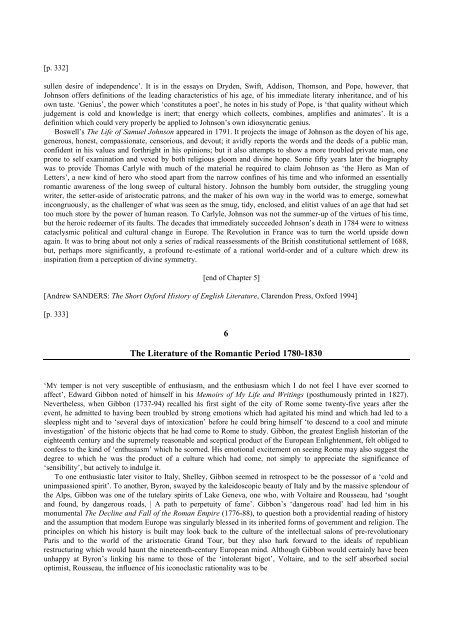THE SHORT OXFORD HISTORY OF ENGLISH LITERATURE
THE SHORT OXFORD HISTORY OF ENGLISH LITERATURE
THE SHORT OXFORD HISTORY OF ENGLISH LITERATURE
You also want an ePaper? Increase the reach of your titles
YUMPU automatically turns print PDFs into web optimized ePapers that Google loves.
[p. 332]<br />
sullen desire of independence’. It is in the essays on Dryden, Swift, Addison, Thomson, and Pope, however, that<br />
Johnson offers definitions of the leading characteristics of his age, of his immediate literary inheritance, and of his<br />
own taste. ‘Genius’, the power which ‘constitutes a poet’, he notes in his study of Pope, is ‘that quality without which<br />
judgement is cold and knowledge is inert; that energy which collects, combines, amplifies and animates’. It is a<br />
definition which could very properly be applied to Johnson’s own idiosyncratic genius.<br />
Boswell’s The Life of Samuel Johnson appeared in 1791. It projects the image of Johnson as the doyen of his age,<br />
generous, honest, compassionate, censorious, and devout; it avidly reports the words and the deeds of a public man,<br />
confident in his values and forthright in his opinions; but it also attempts to show a more troubled private man, one<br />
prone to self examination and vexed by both religious gloom and divine hope. Some fifty years later the biography<br />
was to provide Thomas Carlyle with much of the material he required to claim Johnson as ‘the Hero as Man of<br />
Letters’, a new kind of hero who stood apart from the narrow confines of his time and who informed an essentially<br />
romantic awareness of the long sweep of cultural history. Johnson the humbly born outsider, the struggling young<br />
writer, the setter-aside of aristocratic patrons, and the maker of his own way in the world was to emerge, somewhat<br />
incongruously, as the challenger of what was seen as the smug, tidy, enclosed, and elitist values of an age that had set<br />
too much store by the power of human reason. To Carlyle, Johnson was not the summer-up of the virtues of his time,<br />
but the heroic redeemer of its faults. The decades that immediately succeeded Johnson’s death in 1784 were to witness<br />
cataclysmic political and cultural change in Europe. The Revolution in France was to turn the world upside down<br />
again. It was to bring about not only a series of radical reassessments of the British constitutional settlement of 1688,<br />
but, perhaps more significantly, a profound re-estimate of a rational world-order and of a culture which drew its<br />
inspiration from a perception of divine symmetry.<br />
[end of Chapter 5]<br />
[Andrew SANDERS: The Short Oxford History of English Literature, Clarendon Press, Oxford 1994]<br />
[p. 333]<br />
6<br />
The Literature of the Romantic Period 1780-1830<br />
‘MY temper is not very susceptible of enthusiasm, and the enthusiasm which I do not feel I have ever scorned to<br />
affect’, Edward Gibbon noted of himself in his Memoirs of My Life and Writings (posthumously printed in 1827).<br />
Nevertheless, when Gibbon (1737-94) recalled his first sight of the city of Rome some twenty-five years after the<br />
event, he admitted to having been troubled by strong emotions which had agitated his mind and which had led to a<br />
sleepless night and to ‘several days of intoxication’ before he could bring himself ‘to descend to a cool and minute<br />
investigation’ of the historic objects that he had come to Rome to study. Gibbon, the greatest English historian of the<br />
eighteenth century and the supremely reasonable and sceptical product of the European Enlightenment, felt obliged to<br />
confess to the kind of ‘enthusiasm’ which he scorned. His emotional excitement on seeing Rome may also suggest the<br />
degree to which he was the product of a culture which had come, not simply to appreciate the significance of<br />
‘sensibility’, but actively to indulge it.<br />
To one enthusiastic later visitor to Italy, Shelley, Gibbon seemed in retrospect to be the possessor of a ‘cold and<br />
unimpassioned spirit’. To another, Byron, swayed by the kaleidoscopic beauty of Italy and by the massive splendour of<br />
the Alps, Gibbon was one of the tutelary spirits of Lake Geneva, one who, with Voltaire and Rousseau, had ‘sought<br />
and found, by dangerous roads, | A path to perpetuity of fame’. Gibbon’s ‘dangerous road’ had led him in his<br />
monumental The Decline and Fall of the Roman Empire (1776-88), to question both a providential reading of history<br />
and the assumption that modern Europe was singularly blessed in its inherited forms of government and religion. The<br />
principles on which his history is built may look back to the culture of the intellectual salons of pre-revolutionary<br />
Paris and to the world of the aristocratic Grand Tour, but they also hark forward to the ideals of republican<br />
restructuring which would haunt the nineteenth-century European mind. Although Gibbon would certainly have been<br />
unhappy at Byron’s linking his name to those of the ‘intolerant bigot’, Voltaire, and to the self absorbed social<br />
optimist, Rousseau, the influence of his iconoclastic rationality was to be









